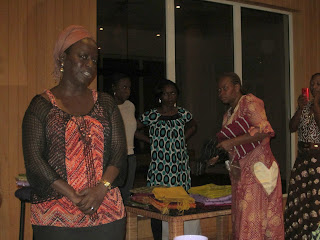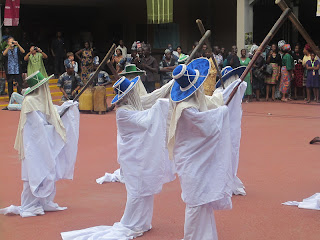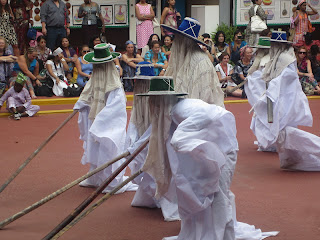Many Nigerian women regularly wear something to cover their hair. It's an easy solution when facing a bad hair day, and it's also an attractive way to accessorize an outfit. Recently the American Women's Club had an evening activity where we learned to tie a head tie, sometimes called head wrap -- the formal head-dress is called a "gele." I'm always in awe at the big gele that you see on the heads of Nigerian women at dressy events like weddings, and even church services. Before weddings, the female guests are often given a gele of a certain color when they indicate they will attend. The fabric may be different depending on if the guest is a friend or family of the bride or the groom. But this practice of dressing alike, called aso-ebi, is sometimes manifested in guests from a particular group all using the same fabric to make their clothing, and sometimes it is women all wearing gele of the same fabric. But even when the fabric is the same, the styles can differ wildly.
I have been to a gele wrapping training session before, but it was time for a refresher course.
Our Nigerian trainer was delightful and really knew her stuff. She could tie the gele on others or on herself and it always looked good.
The necessary item under the visible scarf is a hair net -- more sturdy than what a food service worker would wear. It holds all the hair in and also gives the gele something to grip onto.
She first showed us how to do a casual everyday head tie, with this turban style wrap using a soft scarf like a pashmina.
I think this always looks great on black women and it sometimes looks good on white women, but not as consistently. I would love to use this style, but I don't think I look very good with it.
We then practiced wrapping the formal gele. The fabric that is used for this is very crisp -- I don't know if they use starch or something else. But wrapping it around is very noisy and it almost feels like paper. But it will hold the fold and can spread out very large and hold its shape for a long time.
It was fun to practice and experiment, but I doubt I'll be wearing a gele for an event any time soon.
I have been to a gele wrapping training session before, but it was time for a refresher course.
Our Nigerian trainer was delightful and really knew her stuff. She could tie the gele on others or on herself and it always looked good.
The necessary item under the visible scarf is a hair net -- more sturdy than what a food service worker would wear. It holds all the hair in and also gives the gele something to grip onto.
She first showed us how to do a casual everyday head tie, with this turban style wrap using a soft scarf like a pashmina.
I think this always looks great on black women and it sometimes looks good on white women, but not as consistently. I would love to use this style, but I don't think I look very good with it.
We then practiced wrapping the formal gele. The fabric that is used for this is very crisp -- I don't know if they use starch or something else. But wrapping it around is very noisy and it almost feels like paper. But it will hold the fold and can spread out very large and hold its shape for a long time.
I think these large and elaborate gele are so great -- I love to see all the different styles.
The process can be difficult for the beginner.
And the finished product often looks a little odd on a white woman, in my opinion.
But some women look great with a gele. Here she is using the ase-oke cloth -- a traditional fabric that is made from narrow strips sewn together. It's not as stiff as the other silk-type fabric.
It was fun to practice and experiment, but I doubt I'll be wearing a gele for an event any time soon.









































